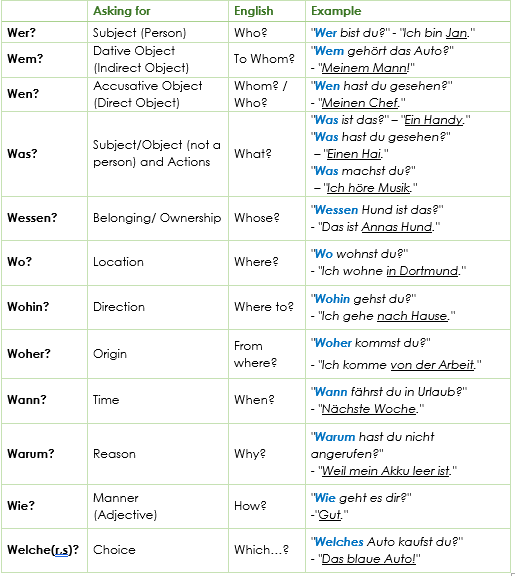Types of Questions in German
There are two types of questions in German (just like in English!):
- W-Fragen (Open Questions)
- Yes/No-Questions (Ja/Nein-Fragen)
Examples:
- „Woher kommst du?“ - „Ich komme aus Deutschland.“
- „Kommst du aus Deutschland?“ – „Ja/Nein.“
Yes/No-Questions (Ja/Nein Fragen)
As the name suggests, yes/no-questions are ones where the only possible answers are yes and no (plus a special word „doch“ for so-called negative questions).
Examples:
Positive Questions: „Kommst du aus Berlin?“
- „Ja, sicher“
- „Nein, aus Bern.“
Negative Questions: „Magst du Lisa nicht?“
- „Doch, ich mag sie.“
- „Nein, ich mag sie nicht.“
What does „doch“ mean?
In English, it's difficult to know how to answer when someone asks a negative question like "Do you not like Lisa?" Does „ja“ mean "Yes, it's correct that I do not like Lisa" or does it mean "Yes, I do like Lisa"?
German has a solution to this problem: the word „doch“. „Doch“ is used when you disagree with what the person said in the question, so in a sense „doch“ means "actually I do."
Remember:
„Doch“ is used whenever you disagree with a question with a negative, because the answer „ja“ would not be clear whether you like the person, as in the example, or agree with the person asking.
Word Order and Yes/No-Questions
The conjugated verb goes in Position 1.
The subject goes in Position 2.
Examples:

Like in English, you can also form a yes/no-question by making a statement and raising your voice at the end of it: "You're coming to the party?" But in order to avoid misunderstandings, it's better to use the standard form of asking a yes/no-question: conjugated verb in position 1 - "Are you coming to the party?"
W-Questions (W-Fragen)
W-questions are questions that use question words. They are called w-questions because all German question words start with the letter "w".
W-questions are asking for more information, and a "yes" or "no" is not enough to answer them.
Just like in English, the German Question Words go in position 1 and the conjugated verb goes in position 2.
Examples:
- „Woher kommst du?“ – „Ich komme aus Deutschland.“
- „Was machst du?“ – „Ich spiele Fußball.“
German Question Words:

Recommendation: Question with Prepositions / Indirect Question
When you ask about things that are used together with a preposition, you usually have to use the preposition in the question word as well. I'll explain how this works in the lesson: Questions with Prepositions.
You can also ask indirect questions. That is, ask something without asking a question (from a grammatical point of view). This is less direct and often more polite. I explain how indirect questions work in the lesson: Indirect Questions.
Summary
- In German, there are w-questions and yes/no-questions
- W-questions start with a question word - in German, all German Question Words start with the letter „W“.
- Yes/No-Questions can be answered with „ja“, „nein“ or „doch“.
Gramato: Your German Grammar Coach
Try Gramato now!
Powered by EasyDeutsch AI

This is how Gramato can help you!
Gramato helps you with all your German grammar questions – fast, to the point, and always based on the trusted content from https://easy-deutsch.com.
Gramato offers fill-in-the-blank exercises on a variety of grammar topics, tailored to your level so you can practice exactly what you need.
Get answers in multiple languages – German, English, Spanish, French, and more. That way, you can understand grammar in the language you feel most comfortable with.
Clear and simple grammar explanations – so you can learn faster and smarter with Gramato.
Ask your questions or practice anytime with Gramato – no wait, just results!
Related Topics:
Entire lesson in German only: Wortstellung in Fragen
For additional information on questions, see: Indirekte Fragen (Indirect Questions) and Fragen mit Präpositionen (Questions with Prepositions)
More information on Sentence Structure and Word order: Satzbau (Sentence Structure).
- Wortstellung im Hauptsätze (Word Order in Main Clause)
- Wortstellung im Nebensätze (Word Order in Subordinate Clause)
- Der unterschied zw. Hauptsätze und Nebensätze (Difference of Main clause & Subordinate clause)
- Verneinung (Negation)
- Die position von „nicht“ (The position of "nicht")
- Satzklammern (Sentence Brackets)
- Konjunktionen (Conjunctions)
- Nebenordnende Konjunktionen (Coordinating Conjunctions)
- Mehrteilige Konjunktionen (Multi-Part Conjunctions)
- Unterordnende Konjunktionen (Subordinating Conjunctions)
- Konjunktionaladverbien (Conjunctional Adverbs)
You can find an overview of all topics under German Grammar.
Recommendation: Free video lessons every Tuesday & Thursday
Sign up now: Email German Grammar course


